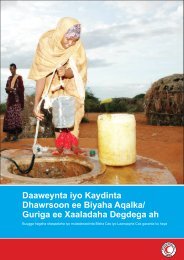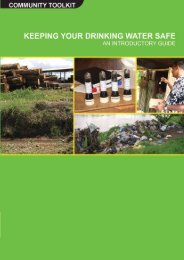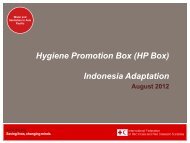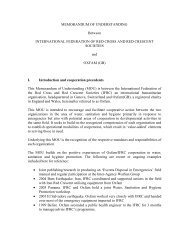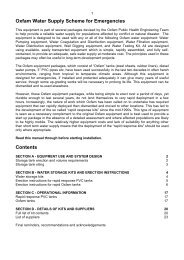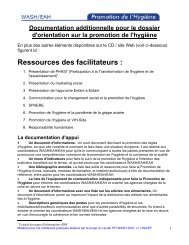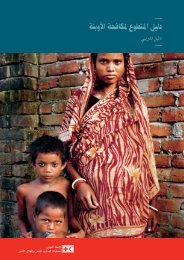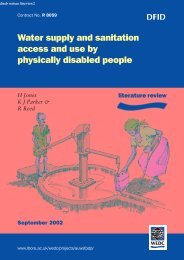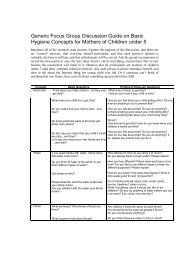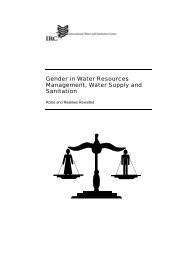Hygiene Promotion - IRC International Water and Sanitation Centre
Hygiene Promotion - IRC International Water and Sanitation Centre
Hygiene Promotion - IRC International Water and Sanitation Centre
You also want an ePaper? Increase the reach of your titles
YUMPU automatically turns print PDFs into web optimized ePapers that Google loves.
While sensitive topics are often better addressed in interviews with individuals, other topicsof more general concern are amenable to focus group discussions <strong>and</strong> communitymeetings (http://www.worldbank.org/poverty/impact/methods/indgroup.htm#focusgroup).During these interviews <strong>and</strong> discussions, several diagrammatic techniques are frequentlyused to stimulate debate <strong>and</strong> record the results. Many of these visuals are not drawn onpaper but on the ground with sticks, stones, seeds, <strong>and</strong> other local materials, <strong>and</strong> thentransferred to paper for a permanent record.Some of the key PRA diagrammatictechniques are:• Mapping techniques (http://www.worldbank.org/poverty/impact/methods/mapping.htm)• Ranking exercises (http://www.worldbank.org/poverty/impact/methods/ranking.htm)• Trend analysis (http://www.worldbank.org/poverty/impact/methods/trend.htm)Visual-based techniques are important tools for enhancing a shared underst<strong>and</strong>ingbetween outsiders <strong>and</strong> insiders, but may hide important differences of opinion <strong>and</strong>perspective when drawn in group settings, <strong>and</strong> may not reveal cultural-based information<strong>and</strong> beliefs adequately. They therefore need to be complemented by other techniques,such as careful interviewing <strong>and</strong> observation, to crosscheck <strong>and</strong> supplement the results ofdiagramming.PRA involve some risks <strong>and</strong> limitations. Many of them are not unique to this method butare inherent in any research method that aims to investigate local conditions. One of themain problems is the risk of raising expectations. This may be impossible to avoid, but canbe minimized with careful <strong>and</strong> repeated clarification of the purpose of the PRA <strong>and</strong> the roleof the team in relation to the project, or government, at the start of every interview <strong>and</strong>meeting. Trying to use PRA as a st<strong>and</strong>ard survey to gather primarily quantitative data,using large sample sizes, <strong>and</strong> a questionnaire approach could greatly compromise thequality of the work <strong>and</strong> the insights produced. And, if the PRA team is not adequatelytrained in the methodology before the work begins, there is often a tendency to use toomany different techniques, some of which are not relevant to the topic at h<strong>and</strong>. In general,when a training element is involved, there will be a trade-off between the long-termobjective of building the capacity of the PRA team <strong>and</strong> getting good quality results in theirfirst experience of using the methodology.Furthermore, one common problem is that insufficient time is allowed for the team to relaxwith the local people, to listen to them, <strong>and</strong> to learn about the more sensitive issues underconsideration. Rushing will also often mean missing the views of the poorest <strong>and</strong> leastarticulate members of the communities visited. The translation of PRA results into ast<strong>and</strong>ard evaluation report poses considerable challenges, <strong>and</strong> individuals unfamiliar withparticipatory research methods may raise questions about the credibility of the PRAfindings.A paper on common flaws in practicing PRA is online available athttp://www.snvworld.org/cds/rgMRD/rural-development/rra-pra_1.htm<strong>IRC</strong> <strong>International</strong> <strong>Water</strong> <strong>and</strong> <strong>Sanitation</strong> <strong>Centre</strong> 91



